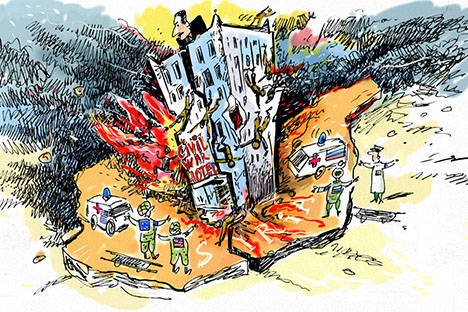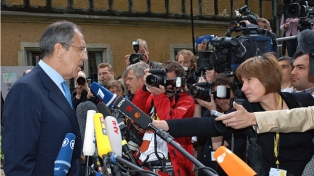Syria is still a partner

Drawing by Alexey Iorsh
Russia and China will not allow a military intervention in Syria, high-ranking officials in the Russian Foreign Ministry have said in official statements. Meanwhile, the Russian Defence Ministry suspended plans to station a group of warships ships in the Mediterranean use the naval station in the Syrian town of Tartus. The fleet that was expected to be stationed at Tartus has been reformed and is no longer heading towards Syria any longer. Experts say the Russian forces are quite modest given the size of Nato fleets in the Mediterranean. Should hostilities start, Moscow would not be able to hold the base at Tartus and would have to evacuate its personnel by air.
Nevertheless, Black Sea Fleet staff say the Tartus base is operating normally. Russia has also denied rumours about the supply of S-300 surface-to-air missile systems to Syria. The Russian Foreign Ministry has pointed out repeatedly drawn the attention of its western partners to the factthat illegal weapons supplies to the region whipped up tension and reduced the likelihood of a peaceful settlement. resolution of the conflict.
But Moscow will not scale down its peaceful co-operation programmes with Damascus. Following talks in Moscow last month, Syrian officials agreed to continue financial and investment co-operation with Russia, as well as other forms of contact in the economic sector. The only exception is new contracts for arms supplies. Even so, Russia’s willingness to continue its economic and political dialogue with Damascus, despite the bloodshed in Syria, does not mean Moscow will enter the war to support the incumbent President Bashar Assad.
Russia’s statements opposing declarations concerning the inadmissibility of military intervention by other countries should be interpreted in the context of comments made earlier by Foreign Minister Sergey Lavrov. He admitted that “if someone decides to resort to power in Syria at any cost, Russia will hardly be able to prevent that move.”
He added: “Yet this should happen at their instigation; this should be on their heads; there will be no authorisation from the UN Security Council for such activities”.
Nikolai Patrushev, secretary of the Russian Security Council, told Interfax news service that Moscow was aware of plans to intervene in Syria based on what happened in Libya, including the creation of a no-fly zone in the north. According to Patrushev, the United States and Turkey are now discussing this possibility.
Russia and China are using diplomatic channels to persuade the West to abandon plans for military intervention. give up the heavy-handed scenario for resolving the Syrian conflict. Moscow suggests addressing the conflict on the basis of the peace plan elaborated in Geneva, which presupposes a transitional government and dialogue with the opposition without prior conditions. The heads of the Syrian delegation to Moscow said they would be ready to negotiate if this pattern was approved, but the opposition refuses to begin talks so long as President Assad remains in office.
Washington supports this demand, which runs counter to the Geneva agreements.
President Barack Obama has warned the Syrian authorities about the possibility of a military operation if the Damascus regime attempts to relocate or use its chemical and biological weapons. Heads of many European nations expressed their solidarity with the US leader and confirmed they would be involved in such a future operation. The Los Angeles Times reported that the Pentagon has drawn up plans to send special forces small teams of special operations troops into Syria to prevent depots containing weapons of mass destruction falling into the wrong hands. It has identified four production facilities: near Homs, Hama, Aleppo, and Latakia. The US military does not rule out precision air strikes to incinerate the chemicals without dispersing them.
Moscow has justifiable concerns that foreign military intervention against Syria could be launched on the pretext of eliminating lethal weapons. But Russia shares the US position that these weapons must not fall into the wrong hands. Islamist groups fighting with the Syrian opposition could use the captured chemical weapons to carry out terrorist attacks. According to Deputy Foreign Minister Gennady Gatilov, the Syrian negotiators in Moscow promised to do their best “to guarantee that chemical weapons stay where they are now”.
Nevertheless, should there be a real threat of terrorists obtaining weapons of mass destruction, Moscow would probably support the efforts of Western countries to eliminate the weapons. In late August, the Security Council powers convened in New York under the chairmanship of France to address the humanitarian situation in Syria. Russia supports all initiatives that guarantee equal access for all stakeholders to humanitarian aid, especially in areas affected by active hostilities. The problem is that, unlike the Syrian army, the opposition has no single command, so it is not clear which of the field commanders should be approached to negotiate ceasefires and deliver humanitarian aid.
Should the West become involved at all at all in the Syrian slaughter, unless there is a real threat of stocks of weapons of mass destruction being seized? Many Near East experts and sources in the special services of Arab countries confirm that not only al-Qaeda, but also other radical Islamist groups from Lebanon, Libya, Tunisia, Jordan and Uzbekistan are fighting alongside the Syrian opposition. Many of these groups are listed as terrorist organisations in the West, so the more such “oppositionists” are neutralised by the Syrian army, the better for many governments. On the other hand, this “terrorist international” fighting the regime could establish a network of camps in Syria if President Assad is forced to flee the country.
Russia and China want the bloodshed in Syria to stop, as does the West. This is the common goal that the international community should use to work out a joint solution. Yet, for this work to resume, everyone should acknowledge that President Bashar Assad still enjoys the support of a substantial part of the Syrian population, which means that national reconciliation cannot be founded exclusively on ultimatums and threats hurled at the head of state.
Yevgeny Shestakov is editor of the international politics desk at Rossiyskaya Gazeta.
All rights reserved by Rossiyskaya Gazeta.
Subscribe
to our newsletter!
Get the week's best stories straight to your inbox
